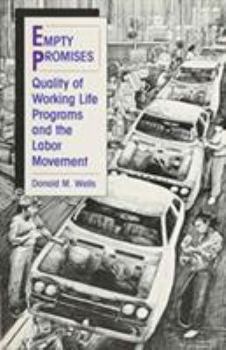Empty Promises
Compares the introduction of Quality of Work Life programs in two different factories, and argues that these programs undermine worker solidarity and weaken unions.
Format:Paperback
Language:English
ISBN:0853457115
ISBN13:9780853457114
Release Date:January 1987
Publisher:Monthly Review Press
Length:167 Pages
Weight:0.50 lbs.
Dimensions:0.5" x 5.4" x 8.2"
Related Subjects
Business Business & Investing Economics Political Science Politics & Social SciencesCustomer Reviews
1 rating
Empty Promises
Published by Thriftbooks.com User , 18 years ago
Quality of Working Life (QWL) programs are now being instituted in workplaces across the United States and Canada. Increasingly popular with management, these programs promise more meaningful work and pleasanter workplaces in exchange for greater productivity from the workers. But while QWL may be good for the company, is it good for the worker? This is the question that Don Wells, a comitted trade unionist and writer, addresses in this book. The core of the book is two detailed case studies of QWL programs that were instituted in two very different plants - one in auto, the other in electronics. Wells gives a day-by-day account of the introduction of these programs, taking the reader with him into committee meetings and onto the shop floor. He argues that by getting workers to adjust to their own subordination, QWL undermines worker solidarity and threatens the very basis of trade unionism. Wells concludes with a chapter that discusses how trade unionists can develop strategies that will counteract QWL's potentially destructive impact. --- from book's back cover





